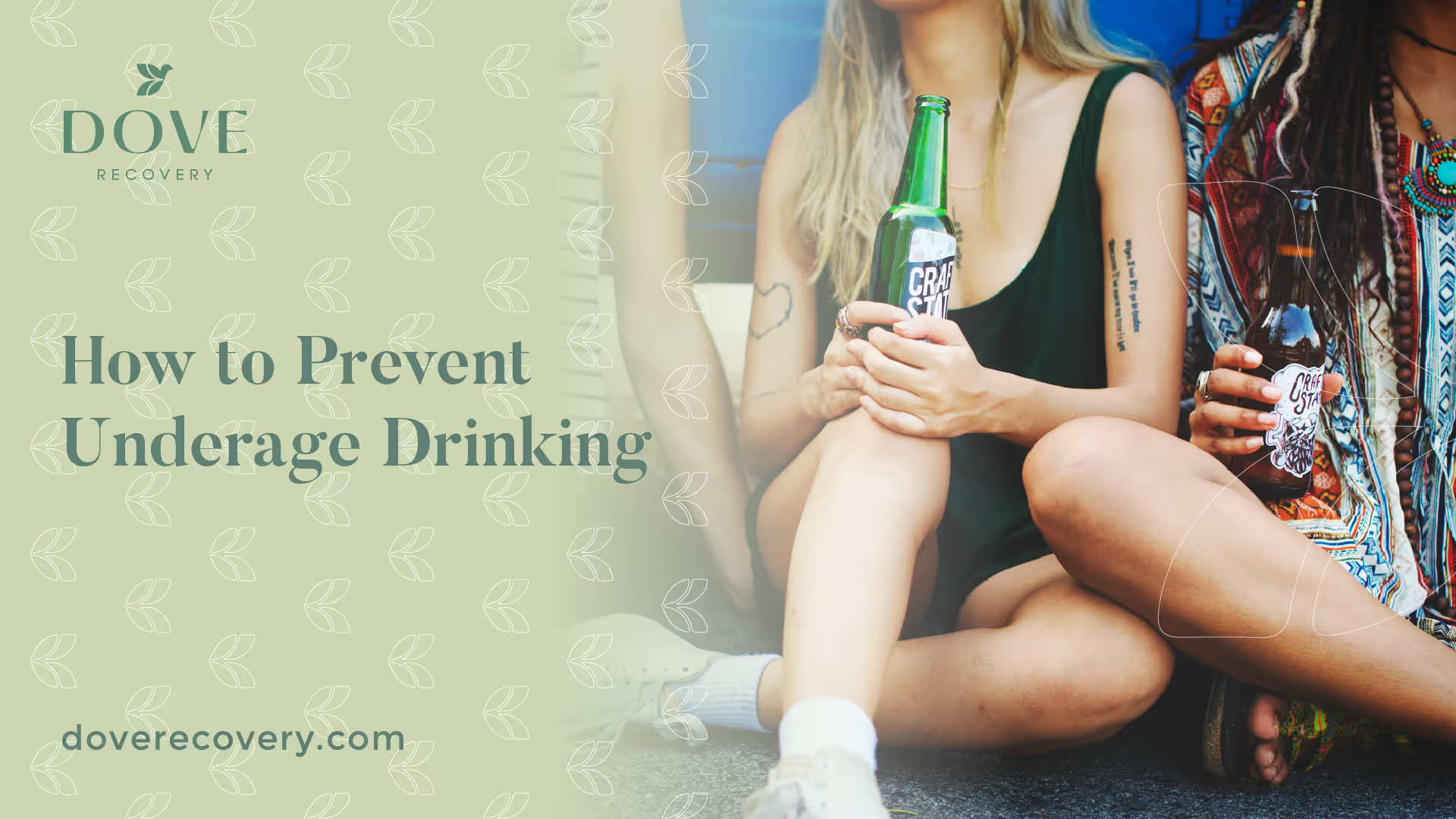How to Prevent Underage Drinking

Why Kids and Teens Drink?
Alcohol consumption is a big issue among young people, and it is important to address it in a responsible and effective manner. Underage drinking can have serious consequences, including accidents, injuries, and even death. In this article, we will discuss how to address alcohol and underage drinking in a friendly and human tone.

Understanding why kids and teens drink is crucial for effectively addressing the issue. There are several reasons why young people may turn to alcohol, including:
- Peer pressure: Young people often feel pressure to fit in with their peers, and drinking alcohol may be seen as a way to do so.
- Stress and difficult emotions: Some young people may use alcohol as a way to cope with stress or difficult emotions.
- Curiosity: Others may simply be curious about alcohol and want to try it out for themselves.
It's important for parents, educators, and other adults to have open and honest conversations with young people about these issues. Providing a safe and non-judgmental environment for discussion can help young people make informed decisions about alcohol use. Educating young people about the risks associated with underage drinking and providing alternatives for socializing can also be effective prevention strategies. By working together, we can help prevent underage drinking and promote healthy choices among young people.
The Dangers of Underage Drinking
Underage drinking can have serious consequences, both in the short and long term.
Short term consequences
In the short term, young people who drink alcohol may experience:
- Impaired judgment and coordination, which can lead to accidents, injuries, and even fatalities.
- Increased likelihood of engaging in risky behaviors such as unprotected sex or driving under the influence.
Drinking alcohol can have serious consequences on young people's health and well-being.
Long term consequences
Underage drinking can have serious and lasting health consequences for young people. Some of the risks associated with underage drinking include:
- Liver disease: Regular alcohol use in young people can lead to liver damage and increase the risk of developing liver disease later in life.
- High blood pressure: Drinking alcohol can raise blood pressure, which can increase the risk of heart disease and stroke.
- Brain damage: The brain is still developing during adolescence, and alcohol use can interfere with this process. This can lead to lasting cognitive impairments, such as memory problems and difficulty with decision-making.
- Injuries: Young people who drink alcohol are more likely to engage in risky behaviors, such as driving under the influence or engaging in physical altercations, which can result in serious injuries or even death.
It's important for adults to take underage drinking seriously and to educate young people about these dangers. By working together to prevent underage drinking, we can help ensure that young people stay safe and healthy in the long term.
How to Prevent Underage Drinking
Educate Yourself
The first step in addressing alcohol and underage drinking is to educate yourself. Learn about the risks and consequences of alcohol consumption, as well as the laws and regulations regarding underage drinking. This will help you to communicate effectively with young people and to offer them guidance and support.
Talk to Your Child
If you are a parent, it is important to talk to your child about alcohol and underage drinking. Be open and honest, and encourage them to ask questions and express their concerns. Explain the risks and consequences of alcohol consumption, and emphasize the importance of making responsible choices.
Set Clear Rules and Expectations
As a parent or caregiver, it is important to set clear rules and expectations regarding alcohol and underage drinking. Make it clear that underage drinking is illegal and will not be tolerated. Set boundaries and consequences for breaking these rules, and enforce them consistently.
Encourage Responsibility
Encourage young people to take responsibility for their actions and to make responsible choices regarding alcohol consumption. Offer guidance and support, and encourage them to seek help if they have a problem with alcohol.
Provide Alternatives
Provide young people with alternatives to drinking, such as sports, hobbies, and other activities. Encourage them to find healthy ways to cope with stress and to socialize with their peers without alcohol.
Tips for Parents on Talking to Their Child About Peer Pressure
As a parent or caregiver, it's important to have open and honest conversations with your child about peer pressure and alcohol use. Here are some tips to help you talk to your child about resisting peer pressure:
- Listen: Listen actively when your child talks about their experiences with peers. Show empathy and understanding.
- Empower: Help your child develop the skills and confidence needed to resist peer pressure. Encourage them to say no assertively, and provide them with alternative ways to fit in with their peers.
- Role-play: Practice scenarios with your child that involve peer pressure and alcohol use. This can help them feel more prepared to handle similar situations in real life.
- Be honest: Be honest with your child about the risks associated with underage drinking. Explain that it's not worth risking their health or safety just to fit in with their peers.
- Set an example: Be a role model for responsible behavior by avoiding excessive alcohol consumption yourself.
By talking openly and honestly with your child about peer pressure and underage drinking, you can help them make informed decisions and resist negative influences from their peers.
How to Identify Warning Signs of Underage Drinking
It's important for parents, educators, and other adults to be able to identify warning signs of underage drinking. Here are some common indicators that a young person may be drinking alcohol:
- Changes in behavior: Young people who are drinking alcohol may exhibit changes in behavior, such as becoming more withdrawn or exhibiting mood swings.
- Physical symptoms: Drinking alcohol can cause physical symptoms such as slurred speech, impaired coordination, and red or glassy eyes.
- Changes in academic performance: Young people who are drinking alcohol may experience a decline in academic performance or attendance.
- Changes in social circles: Adolescents who begin drinking alcohol may start spending time with a new group of friends who also drink.
- Missing alcohol: If you keep alcohol in your home, be aware if there is any missing without explanation.
If you notice any of these warning signs, it's important to talk to the young person about your concerns. Be open and non-judgmental, and offer guidance and support. It's also important to seek professional help if necessary. By addressing underage drinking early on, we can help prevent serious consequences down the road.
Resources for Young People Struggling with Alcohol Use
If you or someone you know is struggling with alcohol use, there are resources available to help. Here are some options:
- National Institute on Alcohol Abuse and Alcoholism (NIAAA): The NIAAA provides information and resources about alcohol use disorders, including a treatment navigator tool that can help you find local treatment options.
- Alcoholics Anonymous (AA): AA is a support group for people who want to stop drinking. They offer meetings and other resources for people of all ages.
- Smart Recovery: Smart Recovery is another support group option that focuses on self-empowerment and cognitive-behavioral therapy techniques.
- SAMHSA National Helpline: The Substance Abuse and Mental Health Services Administration (SAMHSA) offers a free, confidential helpline for people struggling with substance abuse issues. They can provide referrals to local treatment options and other resources.
Remember, it's important to seek professional help if you or someone you know is struggling with alcohol use. These resources can be a great starting point, but they should not replace the advice of a medical professional.
Conclusion
Addressing alcohol and underage drinking is important for the health and well-being of young people. By educating yourself, talking to your child, setting clear rules and expectations, encouraging responsibility, and providing alternatives, you can help young people make responsible choices and avoid the risks and consequences of alcohol consumption.
Sources:
